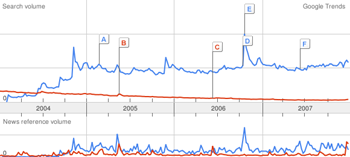Netscape Necrology
Alas, poor Netscape. I knew them heretofore.
It is indeed sad to see the reaper claim Netscape Navigator. And sadly enough, the very thing that brought them fame may well have killed them — namely buzz.
When the net was first being popularized, and HTML was still a quirky technology at best, we had limited choices for web surfing. People with graphical terminals (you lucky *#&**#^!) had Mosaic. Primitive as it was, it at least allowed for direct and intuitive access to the few thousand web pages in existence at that time. It was a durn site better than the text-based browsers (lynx) to which I was restricted.
Then along came Netscape. They picked-up where Mosaic left-off, adding polish and professionalism. Andreessen, Clark and the rest of the Netscape team knew the net better than most anyone at the time, and leveraged that knowledge in one of the earliest instances of Internet buzz marketing.
And it worked … very, very well. Word of Netscape Navigator spread like a Santa Anna wildfire, and soon everyone had downloaded a copy. In short order, buzz had driven Navigator into total market dominance. The only thing that could disrupt this market leadership was to change the default browsing experience, which is what Microsoft did when it began bundling Internet Explorer on every new desktop machine sold on the planet.
Buzz marketing is good, but it is not good enough by itself to displace that degree of forced adoption. Buzz is good enough to claim market, and in this case to end the long life of Netscape Navigator.
 Firefox achieved it’s current market penetration (10% by common estimates, 17% by traffic on this web site) through buzz. By providing something different (a browser that worked the same across three major desktop platforms) and proving itself safer that Microsoft’s browser, they generated self-sustaining buzz. When my non-techie family members started to ask me about Firefox, then I knew its buzz had achieved break-through status.
Firefox achieved it’s current market penetration (10% by common estimates, 17% by traffic on this web site) through buzz. By providing something different (a browser that worked the same across three major desktop platforms) and proving itself safer that Microsoft’s browser, they generated self-sustaining buzz. When my non-techie family members started to ask me about Firefox, then I knew its buzz had achieved break-through status.
The chart above shows the Google search trends for the words “firefox” and “netscape” (Firefox is the blue line — click on the graphic for a larger version). Firefox wasn’t even released until late 2004, and yet had substantial buzz early in the year. Netscape buzz continued its steady downward trend by offering nothing newsworthy.
If anything, Firefox buzz accelerated the demise of Navigator. I won’t opine on if this is a good or bad turn of events, but it illustrates the two edges of the buzz sword. Not only can buzz be used to increase awareness of and demand for a product, it can diminish the demand for competing products. In this buzz is somewhat unique, in effect sucking all available oxygen out of a market and suffocating competitors.
Yet another reason buzz management needs to be part of every marketer’s armory.